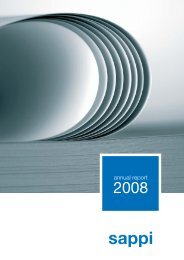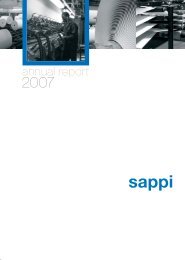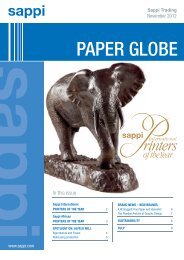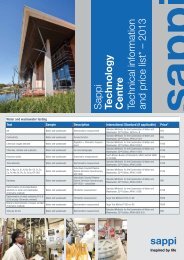2012 Integrated report - Sappi
2012 Integrated report - Sappi
2012 Integrated report - Sappi
Create successful ePaper yourself
Turn your PDF publications into a flip-book with our unique Google optimized e-Paper software.
Component Purpose Characteristics<br />
Variable<br />
Long term incentive<br />
Performance plan shares > Reinforce the guiding principle<br />
for long term performance and<br />
> Conditional grants awarded annually to executive directors and other<br />
key senior managers of the company<br />
shareholder interests<br />
> Cliff vesting after four years if performance hurdles are met<br />
> Align executive interests with<br />
the long term operational<br />
> Performance is measured relative to a peer group of 14 other industry<br />
related companies<br />
growth of the company<br />
> The number of shares allocated is benchmarked externally and is<br />
> Encourage long term<br />
performance based<br />
commitment to the company<br />
> Is a wealth creation mechanism<br />
for executive directors and<br />
other key senior managers if<br />
the company outperforms the<br />
peer group<br />
Broad-based Black Economic Empowerment<br />
Management share > Provide black managers the > Established to meet the requirements of the Forestry Sector Charter<br />
ownership plan<br />
opportunity to acquire equity in<br />
the company<br />
> Eligible employees receive an allocation based on seniority of ‘A’<br />
ordinary shares<br />
> Attract, motivate and retain > Shares vest 40% after three years and 10% each year thereafter<br />
black managers<br />
> Shares can only be taken up after September 2019<br />
> Managers receive the net value in shares or cash at the end of the<br />
lock-in period<br />
Base salary<br />
Base salaries are normally reviewed annually with effect from<br />
01 January each year.<br />
Increases are determined by reference to market competitive<br />
practices among companies of similar size and complexity in local<br />
markets; individual performance; experience; and in the context of<br />
salary increases across the group as a whole.<br />
The policy is that salaries for executive directors and other key<br />
senior managers should typically be at the median of the market.<br />
The company’s policy on compa-ratios range from 80% to 120%<br />
of market median.<br />
The approach to reviewing the base salary of executive directors<br />
is the same as that for other employees.<br />
The base salary increase for executive directors and other senior<br />
key managers in <strong>2012</strong>, was in line with the general salary increase<br />
mandate for all staff, dependent upon location.<br />
Mr Boëttger received a salary increase of 6% on the South<br />
African portion of his salary and 4% on the off-shore portion of his<br />
salary, in line with general staff increases in South Africa and the<br />
United Kingdom respectively. His base salary effective 01 January<br />
<strong>2012</strong> was US$760,640 per annum.<br />
Mr M R Thompson received a salary increase in January <strong>2012</strong><br />
of 10% on his South African salary and 4% on his off-shore<br />
portion of his salary. Mr Thompson’s salary increases also contain<br />
market adjustments to both the on-shore and off-shore portion to<br />
bring his pay in line with other chief financial officers of companies<br />
of similar size and complexity and to position his pay at the<br />
median of the market. Mr Thompson’s base salary with effect<br />
01 January <strong>2012</strong> was US$398,733 per annum.<br />
Retirement benefits<br />
It is the company’s policy that retirement benefits should,<br />
wherever possible, be in the form of defined contribution<br />
arrangements.<br />
Some executive management may still be members of legacy<br />
defined benefit plans. Almost all the group’s defined benefit funds<br />
have been closed to new hires. The contribution rate to executive<br />
directors depends on whether they are members of the defined<br />
benefit fund or defined contribution fund.<br />
Mr Boëttger and Mr Binnie (Mr Binnie was appointed 09 July <strong>2012</strong>,<br />
to succeed Mr Thompson who retired at the end of August <strong>2012</strong>)<br />
are members of defined contribution funds and the company<br />
contributions are fixed at 27.7% of base salary. Mr Thompson was<br />
a member of a defined benefit fund and a defined contribution<br />
sappi <strong>Integrated</strong> Report <strong>2012</strong> 87
















